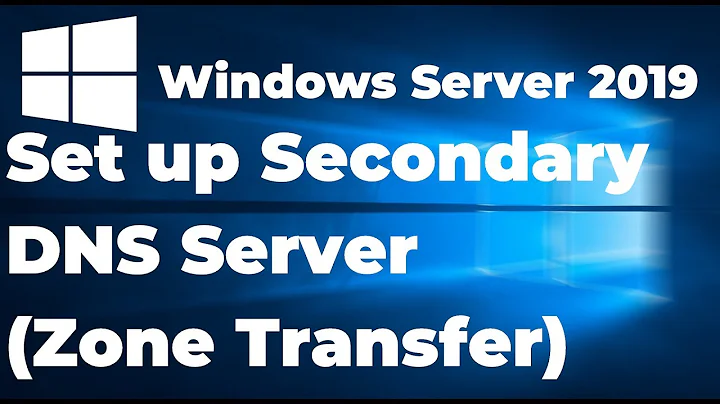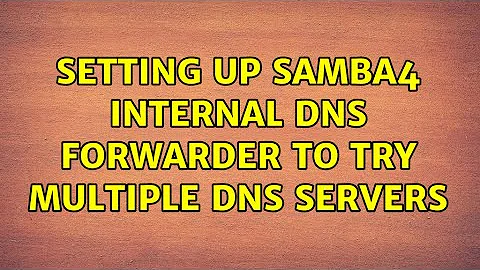Setting up Samba4 internal DNS forwarder to try multiple DNS servers
Solution 1. get a cheap new router - it is higly unlikely your brand new $30 router won't have DNS forwarding function. Check the product specs before buying! It's also strange your new router does not have DNS function - did you check manuals and configuration interface thoroughly?
Solution 2. use google's public dns forwarder. it's quite ok (namebench tests claims google's distributed dns system is 266% faster than using my local bind9 caching-only service) unless you're concerned about privacy (about the fact that google might or might not collect your queries)
and at last, if the OP considers isc bind is too much overhead then maybe a light resolver like dnsmasq or unbound might come to help
Related videos on Youtube
user1671707
Updated on September 18, 2022Comments
-
user1671707 over 1 year
I have SQL Server and a simple table that will be populated automatically from time attendance machines:
[time_id],[time_resource_id],[time_type],[time_date],[time_hour],[time_establishment] 1 123 in 2021-06-19 8:00 1 2 123 out 2021-06-19 10:00 3 123 in 2021-06-19 13:00I would like to convert this to something like
time_resource_id, time_date t1 , t2 , t3 ------------------------------------------------------------------- 123 2021-06-19 8:00 10:00 13:00up to a max of t8.
How can I achieve this? I think something like pivot.
Thanks
-
 Dale K almost 3 yearsPlease show what you tried and where you got stuck.
Dale K almost 3 yearsPlease show what you tried and where you got stuck.
-
-
Costin Gușă over 10 yearshe does NOT want to run bind :) that's clearly stated in the question
-
Frank Thomas over 10 yearshe said he did not want to replace samba resolution with bind, which isn't necessary. I've updated my response to clarify that point. thanks!
-
Costin Gușă over 10 yearsif the OP considers isc bind is too much overhead then maybe a light resolver like dnsmasq or unbound might come to help.
-
Arun over 10 yearsRe: sol1, yeah, I'm surprised our ISP's standard router+modem combo (2701hg-g) doesn't support DNS forwarding. Re: sol2, That's an interesting page...8.8.8.8 sounds like a nice option, but what's with all the errors it reports?
-
Arun over 10 yearsCould you expand on "you will likely have to open a hole for forwarded queries to respond through"? Doesn't it work like every other outbound request?
-
Arun over 10 yearsAlso it gets my primary DNS wrong and doesn't allow me to change it, so I'm not sure I trust the numbers...
-
Frank Thomas over 10 yearsUDP is hard for state-full filtering to deal with, because it is not connection-oriented as TCP is, and thus has no flags that let the NAT wall know that its part of an established connection starting from the inside. the state-full packet filter will try its best to make flows together based on the timing and source/destination addressing, but can't always make the determination that the server response is pursuant to a request made from inside. to make sure you get all your responses, you usually have to open a hole on UDP\53.
-
Costin Gușă over 10 yearsI don't see what errors are you referring to. if you talk about the namebench it's just a wrong header in that page and you have to scroll a little bit down to see the results.
-
Arun over 10 yearsYes, the namebench--it's in the header but also in the results, numerous "incorrect" entries.
-
Arun over 10 yearsWent with Solution 1 here.




